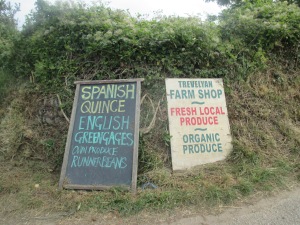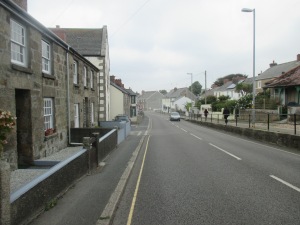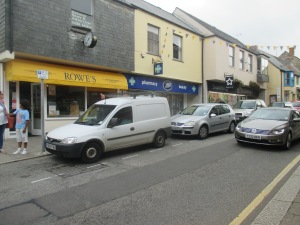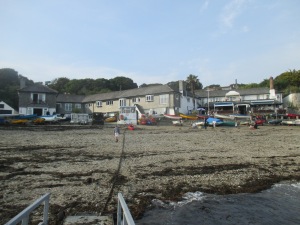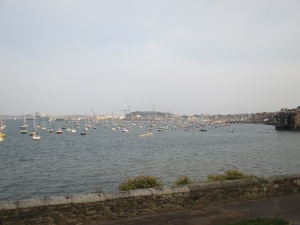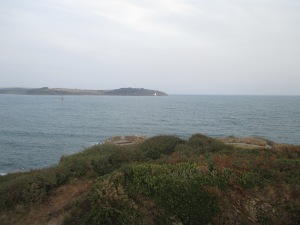‘The poor man, he asked me what do I want, as if I knew…’
– street talk, Falmouth.
For most of its history, Cornwall has not been considered a part of England, but a separate country in itself. Over the last few days I’ve explored its unusually rugged, desolate and mysterious landscape, one where neolithic dolmens and hillside forts stand besides ruined chimneys of tin and copper mines. Few people, few signs of settlement. The terrain seems to reject any settlement. Each act of building feels like a tenuous incursion, one that’ll be washed or blown away by the storms and the sea, unless it meets with the approval of this magic landscape. If so, some air must hover it over it, rendering it jagged, granite-like, immovable and ancient in appearance. The extinction of humankind will not disturb this place. One can picture the great rows of satellite dishes, like those I’ll pass today, surrounded by glossy bracken and covered in lichen, still receiving the faint bleeps of satellites circling in orbit, obsolete, our final trace along with the concrete ziggurats and plastic waste.
The Atlantic lashes against the snarling coastline with unusual ferocity, and the maws of each secluded bay hide the remains of countless drowned men and wrecked ships. There is only one cathedral in the entire county, a late 19th century extravagance in Truro, built when Cornwall was starting to fall under the culture of England. As Wilkie Collins wrote around this time, in Cornwall ‘a stranger is doubly a stranger’. Elsewhere there are countless incidences of very different religions, from the innumerable standing stones to the frequency of non-conformist chapels serving the fishing and mining communities.
Methodism made major in-roads here, becoming one of the major forms of practised religious worship during the late 18th to 19th centuries here, as it did in other industrial areas and cities. Did its valorisation of the poor help bring together a self-constructing working class that then found its voice among trade unions and the early Labour Party, or did Methodism’s political conservatism prevent revolutionary uprisings among the Cornish and others, at a time when the rest of Western Europe was kicking off? Hard to judge, but with the exception of Cornwall, political radicalism and religious non-conformism advanced (and then, receded?) at a similar pace. Discontent with the present, dreams of the future.
The Cornish always remained outside most labour disputes, cut apart from the rest the islands by culture and geography. There are no major towns here, and the sparse landscape still reflects the historical isolation of its communities. The Anglo-Saxons called the place ‘west Wales’, and modern Wales ‘north Wales’, but even connections with the landmass north of the water seem distant. Where is Cornwall heading? As Rhonda pointed out yesterday, it does not have forms of employment, but ways of life: fishing, farming and mining. Each has gone, or is disappearing. ‘You need more in an economy than just tourism, ice cream and deckchairs’, said the late Liberal MP David Penhaligon to miners in Camborne back in 1986. Today, seemingly, the economy’s booming: second home sales, droves of tourists. But huge pockets of deprivation are being left behind, with unemployment, drug abuse, alcoholism and an unusually high rate of domestic violence a feature of its former-industrial communities around Camborne and Redruth. Two days ago, I asked a man in Penzance’s Co-op supermarket about Cornish independence. He welcomed the idea. But now as I chew this thought, I remember something else he said: ‘it’d never work. They’d kill each other’. Cornish society is intensely socially divided. But that it does not have its own assembly is a glaring constitutional problem.
A fitting place to experiment with drama and magic then.
I awake on the edge of Penzance, in a field besides a youth hostel. I pack up quickly and ride out, cycling through the back of the town and then along its promenade, riding by derelict outdoor swimming pools, unloved amusement arcades and the dessicated cadavers of TV repair stores. Penzance wears its decay better than many other seaside resorts though, and the ride along the grey sea-front is pleasant and alive with interesting sights, from stranded art-deco builds to Tesco buses.
Today is the first day I ride east, my final direction home. Instead of cycling into the sunset I’ll be waking up and facing a reddy-golden dawn. Domesticity calls me, the opportunity to wash a dish, sleep in my bed, cuddle the cat, and above all, spend time with my wife. A rough calculation suggests there are fourteen days’ cycling between Peckham and Penzance.
The road out of town towards Marazion is very busy and not for the faint-hearted. A huge retail park is situated on the outer perimeter of the town. Multiple supermarkets have been built next to a McDonalds drive-thru in an act of concentrated ghastliness. Looking around to the extraordinary St. Michael’s Mount and the salty blue textures of Mount’s Bay to my right, and the fishing shambles of Penzance, Newlyn and Mousehole to my left, this site isn’t just out of place, but feels like a bizarre and melodramatic act of self-wounding by local councillors and planners against the beauty around them, as if burdened by its splendour.
I come off the road and pull the bike across a bridge over a railway line, then cycle along the shoreline. Marazion itself is an ancient market town, small but cheery, and quiet today. Numbers of tourists are receding. In its hushed narrow lanes, the postcard dispensers and fish-and-chip sandwichboard offers are conspicuously lonesome. Whilst most of the town is defined by its modest terraces, there are some pleasant surprises, like this fairy-tale town hall in its centre with its playful clockface. Look around the central square, and one will spy small balls on the roofs, built deliberately to deter witches from landing on them. On a war memorial nearby, find inscribed ‘abide with me’, the first words of a remarkable song of the same title, bringing consolation to the wretched, grieving and dying since Marazion’s curate, Henry Francis Lyte, composed them whilst dying of tuberculosis. Just off from the town and its thin beach is St. Michael’s Mount, a forested rock that lunges up from the sea with a monastery built atop a granite plateau. Its outline looms ominously in the distance like a powerful beacon-transmitter of human self-denial.
Leaving Marazion, I’m seeing the landscape change, becoming flatter and less rocky, less interesting dramatic than Penwith. I pass a closed down Chinese restaurant, then reach a pub and a chip shop by Prussia Cove, a wonderful unspoilt shingle beach a mile from here. I’d stop for a swim but it’s a little cold, but for a coastline littered with great beaches, here’s a quieter and more secluded one well worth the walk off the beaten track. I pass Praa Sands and a golf course, the remains of a tin-mining chimney in the distance, and head through the village of Ashton. Like the retail park earlier, Ashton wouldn’t look out of place anywhere else: chain pub, motor-homes, a dusty hotel that brands itself the ‘Elysian Fields’, and ugly detached suburban housing. Even its name is suggestive of Staffordshire or south Yorkshire, the name of a grand old landowner. Riding out, I cycle through the village of Breage, where the blackberries still grow in abundance, and I take a stop, before pedalling on.
Helston is a small town, surrounded with functional council estates, white and well-built in appearance. There are no pretensions about ancient royal charters or tourist attractions. Like Truro and to a degree Penzance, Helston is a town for the Cornish. I ride around a couple of estate/cul-de-sacs before riding along its thin high street, where charity shops, bakers and identikit trad-pubs compete for public disinterest, in a scene that could’ve been cut and pasted from any village high street in England. I head into Rowe’s bakers, selling cheap pasties and flapjacks. Their wholewheat vegetable pasty is the best baked good I’ve ever eaten. Whilst I’m served, a local woman complains about the number of charity shops to me and, remarking on my youth, insists on redirecting me to Falmouth. There’s a friendly bumbling about the town though, and people in the store tell me about their positive experiences of the community here. ‘Community’, I wonder, what does that mean? It seems to differ in every context.
Falmouth is just down the road, but it is only midday, and there is an extraordinary stretch of largely unoccupied wilderness beneath me. So I cross over the River Helford, facing south, and into the vast uninhabited Lizard peninsula.
The road is narrow and quiet, cutting through empty plains and low hillocks. A fierce wind tears against me as I cycle south. After a series of hot and sunny days, today is overcast and cold, and the dour climate is reflected in the featureless and barren nature of the surroundings. For the most part I am hemmed in by hedgerows, seeing and smelling little, but I ride by RNAS Culdrose airfield, a huge airfield and helicopter base shrouded in barbed wire, on an otherwise desolate road.
The Lizard seems forgotten and so many miles removed from anywhere else, like an upstairs back-room of a large house, thoughtlessly wallpapered over and then locked shut for several decades. There is nothing inside, only evidence of the suspension of time. Appearances are, as ever, deceiving. I pass the village of Poldhu, where on 12 December 1901 Guglielmo Marconi transmitted the first transatlantic radio signal to Newfoundland. On this isolated spot stood the world’s largest radio transmitter, once upon a time. A persistent and enterprising genius, Marconi was ridiculed in his home country but pioneered, developed and then built the commercial businesses necessary to popularise radio transmission whilst in England. The wireless, the television: none as we know them without Marconi, and the Lizard has a special place in his experiments. Before Poldhu, Marconi experimented with the waves in a small timber shed besides Lizard Point further south, where I next head.
I cycle through the village of Mullion, but the landscapes are again flat and inhospitable, clumps of heather and lank grasses coating the unusual serpentine stone of the Lizard peninsula beneath. (The name ‘lizard’ probably comes from the Cornish lys ardh, ‘high court’, though no notably powerful structure survives today). The road exhausts itself at the Lizard, a village-terminus, a scattering of souvenir shops and tourist cafes trading off the Lizard’s status of being the most southerly point in Britain. Past the village, the road bores down towards the cliffs of Lizard Point itself, where a large lighthouse keeps watch over a particularly unforgiving tract of sea. Besides the house, Marconi’s hut, where he first received radio waves from the Isle of Wight 185 miles away, and the Lloyd’s signal station, a late 19th century structure which used flares and flags to communicate with passing boats in the times before radio signals.
Lizard Point is predictably precipitous, jagged and dramatic. I rest on a while besides a busy cafe, and join in a silent vigil of the treacherous waters beneath us. Three lifeboat stations, two signal buildings, and one persistent Italian experimenting with the invisible: such is Lizard Point. Its ethereality and deceitful tranquillity are captured by Brian Eno in an eponymous track, a chilling concatenation of eerie lullaby and lunar ambience. I wander by the graffitied ruins of one old lighthouse station and a set of abandoned boats, before wandering back along a narrow cliff-trail up towards the lighthouse. There’s a youth hostel at the top. This fact isn’t very interesting, but its notice is worth reproducing:
‘This youth hostel is one of many in both this Country and Abroad, where people, regardless of race and creed, may spend the night. The buildings are diverse in character, but they have a common purpose; to help all, especially young people of limited means, to a greater knowledge, love and care of the countryside.’
The ethos is poignant in a moment like this, where bigotry, discrimination and war seem to breaking out with new ferocity across the world. Far cheaper than any Travelodge or B&B, the youth hostels and the people who help run them, many volunteers, are some of the most friendly and interesting sites I have travelled through. Many I’ve skipped for reasons of money, instead roughing it wild-camping or opting for the sociality of couch-surfing. But they are indispensable for an appreciation of the wild and rural landscapes of these islands.
Back at the Lizard village, I take a stop at the Top House pub. There are images of former lifeboat crew members dotted around the walls, and some of the benches are made from washed-up timber. The landlady is friendly but a little weary. It’s very quiet in winter, she says, gazing out of the window behind me. I can’t begin to fathom how desolate the area must feel in January or February. I sup a half of HSA by the local St. Austell’s brewery, bland stuff, and look around. She tells me about the people of the village, some solicitors, some nurses. The place is a little overburdened by its tourism, and there’s not much sign of a self-contained community, more a village with self-contained households. Nothing too unusual there. She gives me a suggestion I decide to follow up.
Rather than ride diagonally north-east back towards Falmouth, I decide to follow the southern coastline as best I can, following one narrow road after another. I brush the southern edge of Goonhilly Downs, where a huge complex of around sixty satellite dishes receive signals from across the world, surrounded by the same sparse and desolate heath, and a nearby windfarm. In another unlikely engineering feat, the earth station here was once the largest in the world. ‘Arthur’, a humongous parabolic antenna dish, was built in 1962 to receive radiosignal transmissions from the orbiting Telstar satellite. Not far from Marconi’s innovations, Telstar provided the first television pictures and live feeds, telephone calls and fax signals to be relayed through space, connecting the United States with the UK and France. Its purpose was commercialised mass entertainment. On the 11th July that year, the first live transmission via Telstar was broadcast on BBC at 1am: underwhelming and grainy footage of AT&T chairman Frederick Kappel of about 30 seconds length. Telstar 1 became inoperable after a year, but continues to orbit around the earth.
Fifty years on, there are now 2271 satellites orbiting the earth, half of which are still operative work. Estimates vary, but NASA estimate there to be around 21,000 pieces of orbital debris circling around our planet which are over 10cm in size. Travel from the earth, one must take care not to collide with spent rocket boosters, military spy satellites, discarded gloves and rusting Soviet space stations. Our orbit has become like our oceans, countryside and atmosphere, littered with evidence of the waste, boredom and violence of our species. Is the human race reformable? Can we even reform our own nature? There are times when optimism feels not merely misguided, but wilfully callous, or a load too heavy to bear.
The heather around Goonhilly is quite lovely, much of it flowering, violets contrasting with golden furze and blue wildflowers. I continue following this narrow road along the southern edge of the Lizard, where I come into the village of St. Keverne. Entry is marked by a small industrial estate to my right, and to the left, two lifesize figures cast in bronze. This vague statue commemorates the Cornish uprising of 1497. Led by local blacksmith Michael An Gof and Thomas Flamank, a lawyer in nearby Bodmin, thousands marched from Cornwall across the country in protest against high taxes being levied by Henry VII to wage war against the Scots. History tends to follow some disappointing patterns. Following in the footsteps of Jack Cade and Wat Tyler, the rebels marched to London and camped at Blackheath, as Cade and Tyler had also done. A lack of strategy, canny operating by the king and a paucity of weapons meant that the rebels were either slaughtered or dispersed as they fought at Deptford Bridge.
From this distant corner it began. I picture that movement with the only imaginative coordinates I can, those of my own era. I imagine Cornish men and women gathering first in the inns, then spilling out into the village square or town market-place, asking and debating, what should our future be? They might be like the Spanish indignados or the assemblies in the squares of Cairo or Athens, democracy and the power of the people against corruption and privation. In larger numbers, they build an informal movement, marching into Devon, some 15,000 of them. Support is everywhere: food and drink, places to board, as young sons and enthusiastic men without the burden of childcare joining up. Armouries are raided, talk of battle discussed. Still disagreements within, what should our future be? And who will take charge of it?
Informal disagreements and divisions again. Power corrupts, better to remain forever the opposition, forever on the margins. Or wait, the King, he needs only to see the secret ills of his actions, and then he will ‘wake up’ and help us? Perhaps some make an attempt to produce a written-down record of the people’s demands, like Jack Cade’s ‘The Complaint of the Poor Commons of Kent‘, asking only for fair treatment and due process, but amongst the Cornish, factions and divisions deepen. What should our future be? They approach Kent, hoping the Kentish men will join their revolt as they had Cade’s, but cultural and political divisions are already evident, divide and conquer, and the Kentish men reject them. Now they wait outside London, with little avenue left except to wage war against the king. Death or glory, possibly. Like Jack Cade, all An Gof and the 10,000 left can do is appeal to the help and grace of God. And these questions return again, and again, before capitalism and during it: what should our future be? What is a genuinely democratic and popular agreement that constitutes long-lasting peace, equality, fairness and freedom? The question’s unanswered: Cornwall, Norfolk, Putney, St. Peter’s Square, Kennington Common, and so on.
St. Keverne is a large village with several pubs and a few shops, most clustered around the large open square at its centre. In a small garage beneath a large granite church, three men from a local amateur radio club sit in an orderly row and take turns to speak into a microphone. Intrigued, I wander over.
Ivan is a friendly gentleman and radio enthusiast, and is happy to talk for some time about his hobby. ‘All it takes is a few watts, and through these cables I can reach thousands of people all over the world’, his finger gesturing at a thin wire connecting their radio apparatus to the nearby church steeple. ‘It’s white man’s magic’, he adds. An oddly worded phrase, what does he mean? He tells me of the magic of reaching others. Our world of television, internet and phone calls is based on these mysterious, invisible waves, first experimented upon here, the Lizard. Whereas with a telephone one can only reach one person, with radio, even with the most minimal of power, one can reach hundreds, if not thousands, with fairly cheap technology, making it ideal for anything from amateur radio broadcasting, be it pirate radio stations or ‘CB’ broadcasts, to others utterly mysterious.
There are the ‘numbers stations’, unusual and often irregular broadcasts on shortwave radio. They list series of numbers randomly, usually in a synthetic voice, or sometimes consist simply of inscrutable beeps. They are thought to be used by government intelligence agencies to communicate to their spies in the field, though no state has ever admitted to using them, and no other individual or organisation has ever claimed responsibility behind them. Ivan doesn’t tell me about the numbers stations. My brother instead played recordings of them as we drove through the desolate mountain scapes of north-west Scotland. The recordings, like that of the ‘Lincolnshire Poacher’, are weird and chilling to listen to. Whilst the Lizard may feel a little out the way, it is nothing like the north-western edges of the Highlands, so rugged and far removed from human life, one could be on one of the moons of Saturn.
Look out onto the quiet heathland and fields surrounding St. Keverne, and Goonhilly Downs in the distance. The air and atmosphere is alive with countless signal communications. This is true anywhere. Acquire a basic receiver and tune into the appropriate frequency. Across the world, and beyond it, the satellites orbiting, the satellites dying and drifting out into the cosmos, humans and their machines are transmitting signals to one another. What of those signals no one is receiving? The images I find in my head, the words people tell me, I convert them into a code, words, which I type into text on a computer, using electricity. This code is uploaded onto a website, by a radio signal transmission. Whoever clicks here, receives it, but I wonder about the radio, and these eccentric hobbyists, talking and speaking into their microphones, many receiving, no one receiving. Perhaps some atavistic need is being fulfilled on this isolated peninsula, where now individuals come to broach those huge divisions of space through their radio communications, where for centuries, communities of miners and fishers were so isolated from one another. From one wave, to another.
Each new technology has its pioneers, though today these amateurs kind of nostalgic. I think of the Internet, and the Usenet groups and forums which defined its early usage before social media grooved online habits. Today this amateur club are speaking to whoever happens to respond to their signals. Their conversations with other enthusiasts, most scattered across Great Britain though some in western Europe, are polite and pleasantly dull: how’s the weather, where are you?, etc. I’m fascinated by all this grown up boy’s kit, but the afternoon’s ticking away. I pop into a local shop where I pick up some local ‘Yeast cake’ or fruit loaf, talk to the shopkeeper about the village some more and life here, then decide to press on.
St. Keverne is on the south-eastern tip of the Lizard. The road back to Falmouth is a fair few miles, though an occasional ferry crossing cuts the journey down by an hour or two. I realise that if I thrash myself I might just make it. Cue the landscape becoming horrifically hilly and confusing to navigate. Lanes wind up and down, threading besides pretty lakes and sleepy boltholes, and I cut through to Manaccan, where another lung-bursting climb awaits. Besides a nearby stream, the element Titanium was first discovered by Reverend William Gregor, an amateur geologist, when his eye fell on some unusual black sand. But this boat will be leaving Helford village, still a couple of miles ahead, in less than five minutes. Miss this, and it’s an awful long ride around to Gweek.
Aided by some supernatural wind and sheer panic, I make it in time to Helford. It’s a charming little village, holiday cottages stowed around a small bay filled with pleasure yachts, coasting gently in the evening breeze. I’m the only one boarding, and the easy-going ferryman tells me in friendly fashion about the life here in Helford. I’m pretty shattered, and scarcely take it in, but the views are lovely, as are the pubs, he assures me. Helford Passage is also just as delightful on the other side. I catch my breath before pushing up the next hill towards Falmouth. The ride gets more flat and easy-going from here, and I coast through Mawnan Smith before approaching the conurbation of settlements around Falmouth Bay.
Falmouth is surprisingly built-up and urban. Penryn joins it to the north-west; south-east, I follow the main road through the old Packet Quays and into town of Falmouth itself. It’s quite an ugly place at first, at least, certainly by contrast with the wild splendour of the morning’s ride out of Penwith and across the Lizard. Pass the out of town supermarkets, car showrooms and new-builds, and one enters the rings of low-rise suburbia built around the old port town itself. There’s not much to take in here, so I push on, riding down the North Parade, through the arch of the Packet Quays and down into the old town itself.
The high street quickly becomes charming, a narrow and charmingly tatty lane filled with independent pubs, little shops and bursts of hanging flowers. It’s quiet, though as I approach Finn McCouls pub the town’s energy appears in some form. The new academic year is beginning, and the town is starting to fill with new students at its popular arts college. I continue, pushing towards Falmouth harbour, down the same high street which now gives way to ugly chain stores, a thoughtless melange of things, but OK. There’s a bohemian feel about the place that’s undeniable, even if the centre’s a little ugly and the ostentially-regenerated harbour with its Tesco, museum, Rick Stein restaurant and other chainstore dross feels like a wasted opportunity. I get the impression that Falmouth can handle it. If anything, I’m surprised it’s not more built-up. The harbour is situated in the deepest natural port in Europe, and the third in the world. Until the mid-19th century, all incoming and outgoing mail passed through the port. International news would reach Falmouth before London.
I’m a little weary, and decide to stop at the harbourside for a rest. I spot another man gazing wistfully into the harbour close by me, lost in his own meditations. His name is Trevor. He comes here often, but lives far away. He wears his age heavily, and has compromised too easily with earlier disappointments in life. He shares some stories about Falmouth and its smuggling past, and we part ways.
I’ve arranged to couchsurf in Falmouth, but my host hasn’t responded to any of my messages for the last day or so, and I’m starting to worry. There’s a fair chance that he’ll stand me up, something which has happened in the past. Couchsurfing isn’t always an easy experience. Preparing for the worst, Google maps indicates some large and vacant green space on the eastern edge of the town as it tips into the sea, close by to Pendennis Castle. I cycle past Falmouth’s fully-operating docks, where luxury yachts are made in large warehouses, and cycle up the hill towards the castle. As I wander around the mounds of the castle, sussing camping spots among the trees, I bump into a young man out walking two dogs (or rather, as is really the way, they walk him). He’s a friendly man from the Midlands, and his name is Lee. ‘It’s very friendly here’, he tells me, reaffirming first impressions. ‘They don’t mind!’ There’s an unusual degree of liberalism, tolerance but also a lack of pretentiousness that he particularly likes. The university helps. ‘It’s always fresh. New students, dockers. There’s always new life in the town. Lots of fresh blood each year.’ He gives me advice on where to camp, and where to drink. Both tips prove sound.
I’ve heard nothing from my host! Shit, well, there’s always a bit of good old fashioned wild-camping in a public park. In the meantime, I head back down to the harbour and into the Chainlocker pub, in search of good beer and a place to charge my phone. Outside in the bay, a local oddball croons Cliff Richard through a practice amplifier. Locals and holidaymakers sit outside on picnic tables, applauding nervously and laughing vigorously. I chat to the barmaid for a little while, and she briefly opens a window into her own life before drawing back to praise the feeling of community in Falmouth. The pub is busy, but a good place the pass time in. I can’t help drawing an observation of a strange feature of our conversation, that whenever one person presents a fact about something they’ve experienced, the other feels bound to then demonstrate everything they know about it. So, for instance, whenever I tell someone that I have cycled through Scotland, I am subject to about five minutes of often inaccurate facts, observations and irrelevant past experiences. It’s nae bother! Is there some kind of strange politeness or insecurity at work, do we need to always prove ourselves competent to listen? Or is some vanity at work. Either way, I watch others speaking and so often see them at cross-purposes. The whole thing is wonderful and silly. Information-sharing is about the last thing on the menu.
Nope, my host still hasn’t got in touch. It’s around eleven. I decide to wander back up the high street, seeking out something to eat and to look around. The town’s buzzing with students. Some talk loudly about the studied routines of their drinking, describing a well-honed programme of pre-drinking, pubs and other assorted drinking spots which carry the gravity and joy of the stations of the cross. One guy nearby is confused when a group warmly greet him. He explains his confusion: ‘We were pre-drinking at Sam’s, a bottle of rum. We got into a taxi into town. It was the Kings Head, then… I have no memory of what happened after.’ That explains it. I grab a tray of chips at the Bayside Grill and watch the boozy melee, before drifting back towards the Harbour for a nightcap in the Shipwright’s Inn.
It’s busy here, though there is no ‘bar’ to sit and drink at. Conversation stunted, legs tired, and heart disappointed, I find an outside stool and twist it round to face the harbour. The wind’s playing its nocturnes with the jangling sailboats and sighs of the sea. Scenes from Pulp Fiction are quoted loudly, til a couple fall out dramatically over the better of two Tarantino films.
Wearied, I ride back up towards Pendennis Castle, and head round to its base. At first I seek out a small bit of secluded woodland Lee recommended, but as I ride through the pitch-black a pretty out-of-it looking young man appears by the road nearby, and erring on caution, I ride on. There’s a car-park by Pendennis point where I’d stood earlier, watching the sunset. There’s a couple of vehicles parked there now, providing the right mix of discreet yet near-enough human habitation to assure a feeling of safety. Back once again by the Atlantic, I pitch up by the foundations of some old fortification and catch some sleep.



























